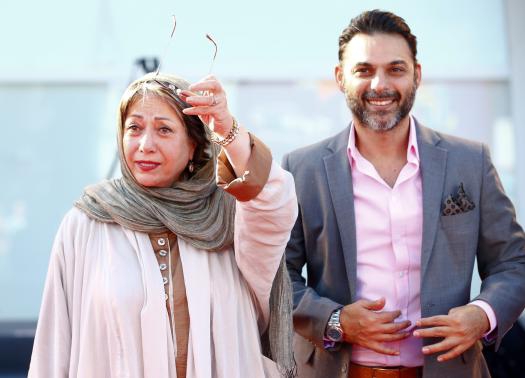 Director Rakhshan Banietemad (L) and actor Peiman Moadi arrive at the red carpet for the movie "Ghesseha (Tales)" at the 71st Venice Film Festival August 28, 2014.
Director Rakhshan Banietemad (L) and actor Peiman Moadi arrive at the red carpet for the movie "Ghesseha (Tales)" at the 71st Venice Film Festival August 28, 2014.CREDIT: REUTERS/TONY GENTILE[/caption]
(Reuters) - Films about a 1960s massacre in�Indonesia�and the harsh conditions in�Iran�under present-day international sanctions and how they affect ordinary people struck somber notes at the Venice Film Festival on Thursday.
A French caper based on a fictionalized version of a true story about the theft of Charlie Chaplin's coffin shortly after his death in 1977 was shown as one of 20 films in contention for the festival's top prize, to be awarded next week, and provided a macabre, touching and often humorous counterpoint.
Eugene Chaplin, Chaplin's son, said at a news conference he had been skeptical about cooperating on director Xavier Beauvois's "La rancon de la gloire" (The Price of Glory) because "I didn't see what could be funny about stealing a coffin". But, after seeing Beauvois's films, "I thought, 'Why not?'"
American director Joshua Oppenheimer's "The Look of Silence", shown out of competition, is his second documentary based on death squads that roamed�Indonesia�in the wake of a failed communist-led coup attempt and killed as many as a million people. The first, "The Act of Killing" (2012), was nominated for an Oscar in the documentary category.
Asked at a press conference on Thursday why the credits for the new film, which had its premiere on Wednesday night, mostly read "anonymous", Oppenheimer said the production crew was at risk if their identities were revealed.
"There is a grave political risk for anybody involved with the crew in Indonesia if their identities become known to the authorities, especially to the military and the paramilitary group that played such a prominent role in my previous film."
He also said that Adi Runkin, a traveling optometrist who meets with some of his brother Ramli's killers in the course of the new film, had to move to a different part of Indonesia due to concerns for his safety once the film was released.
Runkin, who is in his 40s, said he agreed to participate after seeing clips assembled by Oppenheimer that had showed him the magnitude and brutality of the killing, and convinced him the past had to be confronted to assure a better future.
"I only want the perpetrators to acknowledge and admit what they did and to acknowledge that they were wrong so that we would somehow be able to actually forgive each other and live together, that's all I wanted from those confrontations," he said in remarks translated into English.
"We live in one community which is split by mutual feelings of suspicion and fear and I really want all of this to end."
Iranian director Rakhshan Bani-Etemad said she had not had to film underground in�Iran where her film "Ghesseha" (Tales) was shot, at least in part with a digital camera that with its grainy images emphasizes the grittiness of life in Tehran.
"The main thing is that the story, the project, needs to be accepted within the country, it needs to reflect peoples' lives," she said after the film's first festival screening.
What it shows in a bleak and desolate-seeming Tehran, the lives of people with barely enough money to survive being made more miserable by a Kafkaesque bureaucracy, unemployment, drug addiction and wife abuse.
In one case a functionary will not listen to an elderly former civil servant's plea to recoup crippling medical costs because the bureaucrat is more interested in taking a call from his mistress.
Also shown are the aimless and drug-scarred lives of young people who cannot get proper jobs, like a formerly promising university student named Hamed who was expelled for his political views and now drives a taxi cab part-time, helping chauffeur people to and from a center that helps battered wives.
Bani-Etemad, who is one of Iran's best known directors, said that the film was intended in part to show how the international sanctions imposed on Iran over its disputed nuclear program have had a devastating effect on daily life.
"The economic situation in Iran is critical and this is due to the embargo which actually penalized the people in the country," she said. "Our children, who suffer from very severe diseases like cancer and multiple sclerosis, are actually suffering from the consequences of the embargo."
She urged people at "the international level" to realize that "international decisions always affect the people".
By Reuters
The Iran Project is not responsible for the content of quoted articles.











